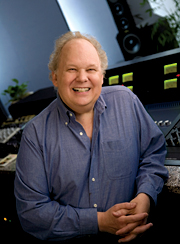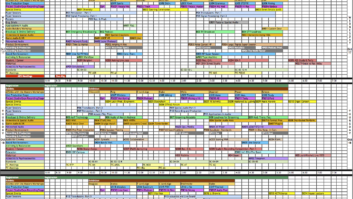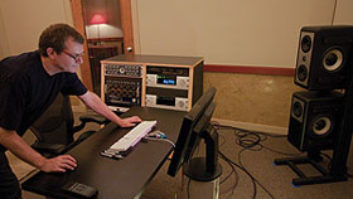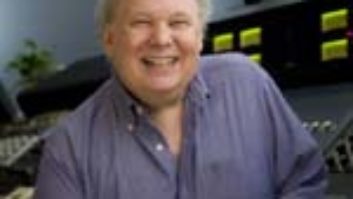
What’s driving this resurgence in vinyl?
I think part of it is, the kids who have grown up in this generation have never experienced having a vinyl record in their hands, with that big artwork; it’s so tactile, so physical. It’s really such a different kind of a being than a cold MP3 file — you know, if it’s coming over an Internet connection and it goes in your ears, there’s nothing to feel.
A lot of it might be that, and hopefully this whole loudness war thing that we’ve been through with the CD, there’s no more room to go. These things are just stupidly loud and annoying to listen to. There’s quite a big backlash.
Do you think the loudness wars have reached critical mass?
I’m having that feeling, yeah. I’m thinking people are realizing that it’s one thing to have your iPod on “shuffle” and have your song be the loudest thing; to put out something that in an iPod shuffle won’t sound as loud as what comes before and after it does take a certain amount of guts as a producer.
As a mastering engineer, people sometimes blame us for things we have no control over. Mixers themselves have found that certain A&R departments and record company executives wouldn’t approve their mixes unless they were already that loud. So the mixers, in self-defense, started premastering stuff before they sent it to me, and pre-squishing it and compressing it. And then we get it, and everybody in the band is used to this by now, and if you don’t give them something back that’s at least that loud, they think that you’re not very good. It’s a very deadly situation.
So what do you do?
Well, you try to educate. There’s a couple of bands I work with, like Tool — I remember Danny Carey, the drummer from the band, walked into the studio session, and said, “We don’t care if our record’s the loudest record on the radio, we just want to have the quality of what we’ve achieved in the mix,” and I just have to admire that.
Lately, there seems to be a growing consumer awareness.
Well, I hope so. There’s nobody out there educating people to think that the “normal” thing, their MP3s, aren’t as good as they could be. I think a lot of people falsely think that they don’t have the ears to tell the difference. And I think the average person would be surprised to find out how good their hearing is.
How does more widespread access to studio technology affect the projects you get?
The average record comes in to us probably sounding worse than it ever has, as far as quality goes. Believe me, the good guys are still doing great work. But a lot of the indie stuff we get, some of it sounds pretty bad. So a good mastering engineer can turn something that sounds like dog meat into something that sounds at least normal. So by spending a few thousand dollars on good mastering, it will sound like your budget went up $100,000.
What are some albums that you consider benchmarks of great projects?
When I was really young, I mastered Led Zeppelin II to vinyl and Houses of the Holy; I never dreamed that all these years later, that band would still be keeping new bands off the air. [Laughs] If you look at 1969, when that record [Led Zeppelin II] came out, and look at the 39 years it is to here, 39 years before Zeppelin, you’re talking about Louis Armstrong, Gershiwin or Cole Porter. It’s just amazing that after the ’60s, so much of that music has stuck for so long. It’s never been that way in the history of music before, that I know of.
I did the early Band records; that’s one of my favorite groups ever. I remember when I first heard that music, I was knocked out by it, and all these years later it still knocks me out. And then I got to work with Jimi Hendrix for a day; I cut some reference discs for him on Electric Ladyland. Some of the artists whose whole catalog I’ve done, or most of it, like Bruce Springsteen — he’s a superstar in so many ways; besides being the consummate poet, he’s a great songwriter, and obviously great musician and performer, and he’s a great person. It’s always a privilege to be able to have contact with someone like that, even for a short while. I’ve done most of John Mellencamp’s catalog, all of Bryan Adams. Or Nirvana. And the Foo Fighters. And Beck’s one of my favorite artists, too. Lots of favorites!
How important is it to bring a musical perspective to mastering?
It’s inconceivable to me to be in the music industry without being a musician. Everybody at Gateway Mastering [Ludwig’s Portland, Maine, facility] is a musician. There are some guys who have good reputations who aren’t, and through the years they have learned how to relate to musicians. But for me, all the technical part, you just have to know that 110 percent. All of the gear, it’s just got to be so under your fingers that it doesn’t show up as an issue as much as the creative part of it, trying to see what aesthetic is going to make this record be as good as it possibly can.
We’re the last shot that an artist and producer have to make the music that they worked so long and hard on sound better. It’s a responsibility I take very seriously. I think when you’re mastering, if you’re any good at it, you try to stay in your right brain, the creative part of your brain, and the more gear you have that takes you away from that, the less creative you can be.
Sarah Jones is the editor of Mix.






